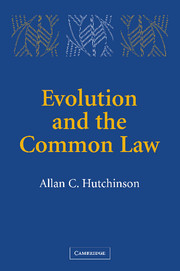Book contents
- Frontmatter
- Contents
- Preface
- Table of Cases
- 1 Evolution and the Common Law: An Introduction
- 2 Darwin's Excellent Adventure: Evolution and Law
- 3 The Creationists' Persistence: Jurisprudence and God
- 4 Taming the Bulldog: The Natural and the Pragmatic
- 5 Tracking the Common Law: The Routine and the Revolutionary
- 6 Looking for Gadamer: Traditions and Transformations
- 7 Reading Between the Lines: Courts and Constitutions
- 8 Making Changes: Progress and Politics
- 9 Among the Trees: A Conclusion
- Index
9 - Among the Trees: A Conclusion
Published online by Cambridge University Press: 04 December 2009
- Frontmatter
- Contents
- Preface
- Table of Cases
- 1 Evolution and the Common Law: An Introduction
- 2 Darwin's Excellent Adventure: Evolution and Law
- 3 The Creationists' Persistence: Jurisprudence and God
- 4 Taming the Bulldog: The Natural and the Pragmatic
- 5 Tracking the Common Law: The Routine and the Revolutionary
- 6 Looking for Gadamer: Traditions and Transformations
- 7 Reading Between the Lines: Courts and Constitutions
- 8 Making Changes: Progress and Politics
- 9 Among the Trees: A Conclusion
- Index
Summary
Prediction is extremely difficult, especially about the future.
Yogi Berradespite the revolutionary quality of his ideas, charles Darwin lived a very traditional and settled existence at Down House in the Kent village of the same name. As a privileged member of the landed class, he assumed his pastoral responsibilities toward its 500 or so inhabitants with characteristic goodwill. He was appointed a Justice of the Peace in 1857 and fulfilled his parochial duties until his death. Across the lobby from his comfortable study where he wrote The Origin of Species, he would sit in the dining room behind a large table with a high-backed chair and mete out amiable justice to local miscreants. His magisterial agenda ran the limited gamut from prosecuting poachers through discouraging animal cruelty to issuing pig licenses. The contrasting images of Darwin as a morning naturalist and an afternoon judge are so suggestive of the main themes that I have sought to identify and develop throughout the book. Indeed, Darwin's daily routines capture the nexus, both literal and figurative, between large scientific themes and focused legal applications: The complete Darwin is equal parts theorist and equal parts practitioner. Similarly, while biology and jurisprudence seem to be entirely separate disciplines, the fact is that they share a vital dependence on close and contextualized study that is as much accountable to parochial circumstances as it is to generalized principles.
- Type
- Chapter
- Information
- Evolution and the Common Law , pp. 271 - 292Publisher: Cambridge University PressPrint publication year: 2005

